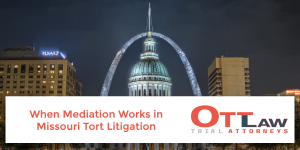## The Role of Mediation in Missouri Tort Litigation
Mediation serves as an important alternative to traditional courtroom battles in tort litigation, particularly in Missouri. This process facilitates an open dialogue between the involved parties, aiming to resolve disputes without resorting to lengthy and costly trials. In a state where the civil justice system encounters an overwhelming number of cases, mediation can offer a more efficient path to resolution. By understanding when mediation is most effective, parties can save both time and resources while achieving satisfactory outcomes.
In Missouri tort litigation, mediation can be a valuable tool for parties seeking to resolve personal injury claims, property damage disputes, and other civil issues efficiently. Its effectiveness often hinges on the willingness of both parties to communicate openly and negotiate in good faith. Mediation generally involves a neutral third party who assists in guiding the discussion, ensuring that all relevant points are addressed and helping to frame solutions that are acceptable to both sides. This reliance on dialogue instead of confrontation can foster a more amicable resolution to disputes, thereby preserving relationships and reducing animosity.
Mediation is not without its limitations, and understanding when it is likely to succeed is vital. Factors such as the complexity of the case, the positions of the parties, and the level of communication can significantly influence the outcome. This section highlights the importance of analyzing the specific context of each case and determining whether mediation stands as an appropriate avenue, particularly in Missouri tort litigation.
## Understanding Tort Litigation
Tort litigation refers to the legal process by which a person seeks compensation for harm caused by another’s wrongful act. This encompasses a broad range of civil cases, including personal injury, defamation, and property damage, among others. In Missouri, these types of cases involve specific laws and regulations that can significantly impact the outcome. Understanding the nuances of tort litigation is essential for anyone who may find themselves embroiled in a dispute of this nature.
At its core, tort litigation revolves around the principle that individuals or entities should be held accountable for the harm they cause others. This accountability is the foundation of seeking damages in tort cases. Missouri law recognizes various forms of torts, including intentional torts, negligence, and strict liability. Each category has its own set of rules governing how a case is pursued and what evidence is needed to substantiate a claim. Individuals engaged in tort litigation must navigate these legal intricacies to effectively advocate for their rights.
The outcome of tort litigation can dramatically influence the lives of the parties involved. Compensation from successful claims can cover medical expenses, lost wages, and emotional distress, thereby providing vital support for recovery. Because of this potential impact, understanding the intricacies of tort litigation is not merely academic; it is a necessity for anyone involved in such disputes within Missouri’s legal system.
## Significance of Mediation in Tort Litigation
The significance of mediation in Missouri tort litigation cannot be overstated. As courts become increasingly clogged with cases, alternative dispute resolution methods like mediation emerge as not only practical solutions but also necessary responses to an overloaded legal system. The effectiveness of mediation lies in its structured environment, which can help parties communicate their grievances and find common ground without the adversarial nature of a trial.
Engaging in mediation can provide parties with more control over the outcome than traditional litigation. In court, decisions are dictated by judges or juries, potentially resulting in unpredictability. Conversely, in mediation, interested parties collaborate to reach a mutually beneficial solution, decreasing the possible emotional toll that litigation may incur. Moreover, mediation allows for creative solutions that a traditional court might not provide, which can lead to more satisfactory and tailored outcomes for all involved.
Additionally, mediation can help prevent the long-term fallout often associated with tort litigation. Legal battles can foster animosity and long-lasting dissatisfaction, whether or not a favorable verdict is reached. Mediation promotes restorative dialogue, which encourages parties to better understand each other’s perspectives. By helping to maintain relationships, mediation serves as a valuable tool not just for resolving disputes but also for fostering peace and understanding within Missouri’s communities.
## Legal Framework Surrounding Mediation in Missouri Tort Cases
In Missouri, mediation is governed by several statutes and court rules designed to facilitate its use as an alternative to litigation. The Missouri Supreme Court has established guidelines that not only codify the mediation process but also outline the qualifications needed for mediators. This structured approach helps ensure that mediation remains a viable option for resolving tort litigation effectively.
The legal framework also emphasizes the importance of confidentiality in mediation. Conversations and agreements made during this process are generally protected from disclosure in subsequent court proceedings. This confidentiality encourages open discussion and negotiation, allowing parties to express concerns without the fear that their statements will be used against them later. As a result, parties are often more willing to work collaboratively toward a resolution.
Additionally, Missouri law encourages courts to explore mediation as a means to resolve disputes before heading to trial. Many courts will mandate mediation sessions for certain types of cases, highlighting its judicial support as an effective method of case resolution. Understanding this legal context can help parties navigate their options when facing tort litigation, enabling them to take full advantage of mediation where appropriate.
## Practical Examples of Tort Litigation Resolved Through Mediation
Real-world scenarios illustrate the effectiveness of mediation in tort litigation. Consider a case where two drivers were involved in a vehicular accident resulting in significant injuries and vehicle damage. Rather than dragging the matter out in court, both parties agreed to mediation. During the sessions, they were able to express their grievances and negotiate a settlement that compensated both for damages sustained without the emotional and financial toll of a lengthy trial.
Another example involves an obstetrics malpractice claim resulting from alleged negligence during childbirth. In this situation, both parties understood the complexities and emotional weight of the case, which made mediation a favorable option. Through facilitated dialogue, they were able to reach an agreement on compensation for the affected family without going through the rigors of a court trial, allowing all involved to move forward more quickly and positively.
A third instance can be found in disputes over property damage from a construction defect. Homeowners and contractors entered mediation sessions where they could discuss the issues surrounding the defect directly. By establishing a respectful communication channel, they were able to find a solution that addressed repairs and compensation without escalating the dispute to a legal battleground, showcasing how mediation can provide mutually beneficial outcomes.
## Steps to Engage in Mediation for Tort Litigation
Engaging in mediation requires careful planning and consideration. First and foremost, parties must decide if mediation is appropriate for their situation. This involves a thorough evaluation of the facts, the nature of the disputes, and the willingness of both parties to engage in constructive dialogue. Once the decision is made to pursue mediation, the next step is to find a suitable mediator with experience in tort litigation. The mediator should have the ability to remain neutral while facilitating effective communication between the parties.
In preparation for the mediation sessions, each party should gather relevant documentation and evidence to present. This can include medical records, accident reports, and photographs, depending on the specific nature of the tort. Having this information organized and ready for presentation will enable parties to illustrate their positions effectively during discussions, aiding the mediator in facilitating a meaningful dialogue.
During the mediation session itself, parties should approach the process with an open mind and a willingness to find common ground. Clear communication is key; each party should be prepared to articulate their concerns and needs while also listening to the other side. Active participation combined with a solution-oriented mindset can greatly enhance the likelihood of a successful outcome, allowing parties to move forward without further disputes.
## Avoiding Common Pitfalls in Mediation
While mediation presents numerous opportunities for resolution, parties must also navigate common pitfalls that could hinder constructive dialogue. One predominant mistake is failing to prepare adequately for the mediation session. Arriving unprepared can undermine a party’s position and limits their ability to negotiate a satisfactory outcome. It is crucial that both parties understand their case, the relevant facts, and potential outcomes in the absence of mediation.
Another common error is allowing emotions to cloud judgment. Mediation ideally provides a space for calm and constructive negotiation, yet strong emotions can derail discussions quickly. Parties must focus on the issue at hand rather than personal grievances, ensuring that the conversation remains productive and solution-focused. Keeping the communication professional will create an environment more conducive to collaboration.
Lastly, some parties may enter mediation with an inflexible mindset, unwilling to consider compromises or alternatives. This rigidity can thwart the negotiation process altogether. Approaching mediation with an open attitude and a readiness to explore various options is essential for achieving a resolution that meets the interests of all involved parties.
## The Importance of Seeking Legal Counsel Before Mediation
Before entering mediation for tort litigation, it is prudent to seek legal counsel. An attorney familiar with tort law can provide invaluable insights into the strengths and weaknesses of a case, including potential outcomes should the matter proceed to trial. This informed perspective allows parties to approach mediation with realistic expectations, boosting the chances of reaching an acceptable resolution.
Legal counsel can also assist in selecting an appropriate mediator. A lawyer with experience in tort litigation can recommend mediators who have a proven track record in handling similar cases. This enhances the likelihood of finding a suitable professional who can navigate the nuances of the specific dispute effectively.
Moreover, legal representation can foster effective communication during the mediation process itself. An attorney can facilitate discussions, ensuring that a party’s interests are represented accurately and thoroughly. They can also help frame the conversation around constructive points and potential solutions, guiding the negotiation toward a favorable outcome while reducing the emotional strain on the parties involved.
## Advantages of Legal Representation in Mediation
The benefits of having legal representation during mediation for tort litigation are manifold. One of the primary advantages is the expert guidance provided by an attorney. They can advise on negotiation tactics, help frame the party’s positions clearly, and ensure that important legal principles are upheld during discussions. Their background in tort litigation equips them with the skills necessary to navigate complex legal and factual issues that may arise during mediation.
Additionally, legal representation enhances the effectiveness of negotiating settlements. An attorney can assess proposals critically and advise clients on reasonable offers based on the law and the specific circumstances of the case. Their presence acts as a buffer against undue pressure or persuasion from the opposing party, protecting their client’s interests and ensuring that any agreement reached is fair and equitable.
Furthermore, having legal counsel present helps streamline communication during mediation. An attorney can act as a conduit for information, helping parties articulate their needs and perspectives more effectively. This organized communication allows the mediator to focus on facilitating the dialogue rather than resolving misunderstandings. Overall, legal representation augments the likelihood of a successful mediation outcome, benefiting all parties involved.
## How Ott Law Firm Supports Clients in Tort Litigation Mediation
Ott Law Firm stands out as an accomplished ally for clients navigating the mediation landscape in tort litigation throughout Missouri. With a commitment to understanding each client’s unique situation, the firm cultivates a personalized approach to mediation that prioritizes the client’s needs and objectives. By leveraging in-depth knowledge of Missouri tort law and court systems, Ott Law Firm equips clients with the tools necessary for effective negotiation and resolution.
One of the cornerstones of Ott Law Firm’s approach is its emphasis on open communication. The attorneys actively listen to their clients, ensuring a comprehensive understanding of the issues at hand. This client-centered philosophy empowers clients to feel confident during mediation and provides attorneys with the insight needed to advocate effectively. The firm’s attorneys skillfully guide clients through every stage of mediation, from selecting the right mediator to preparing for and participating in the sessions.
Moreover, Ott Law Firm’s longstanding reputation within the Missouri legal landscape ensures that clients have access to experienced mediators familiar with the complexities of tort litigation. This network, combined with the firm’s unwavering dedication to securing optimal outcomes for clients, positions Ott Law Firm as a premier choice for those seeking representation in mediation. Their commitment to achieving fair resolutions while minimizing conflict aligns perfectly with the principles of mediation, making them an invaluable partner in the process.
## Frequently Asked Questions Regarding Tort Litigation
## Additional Resources
For individuals seeking to learn more about tort litigation and mediation in Missouri, there are several valuable resources available. The Missouri Bar Association website offers a comprehensive collection of articles, guidelines, and forms related to tort cases and mediation processes. Additionally, local law libraries can provide access to legal texts and resources that delve into the specifics of tort law.
Books specifically focused on mediation techniques and tort litigation strategies can also be beneficial for understanding the nuances and preparing for potential cases. Organizations such as the American Bar Association provide resources and training materials related to mediation and alternative dispute resolution that can be particularly useful.
Networking with local attorney groups or legal workshops can also offer insights into current practices and developments within the realm of tort litigation in Missouri. These opportunities allow individuals to connect with legal professionals, gaining knowledge and support relevant to their specific situations.














